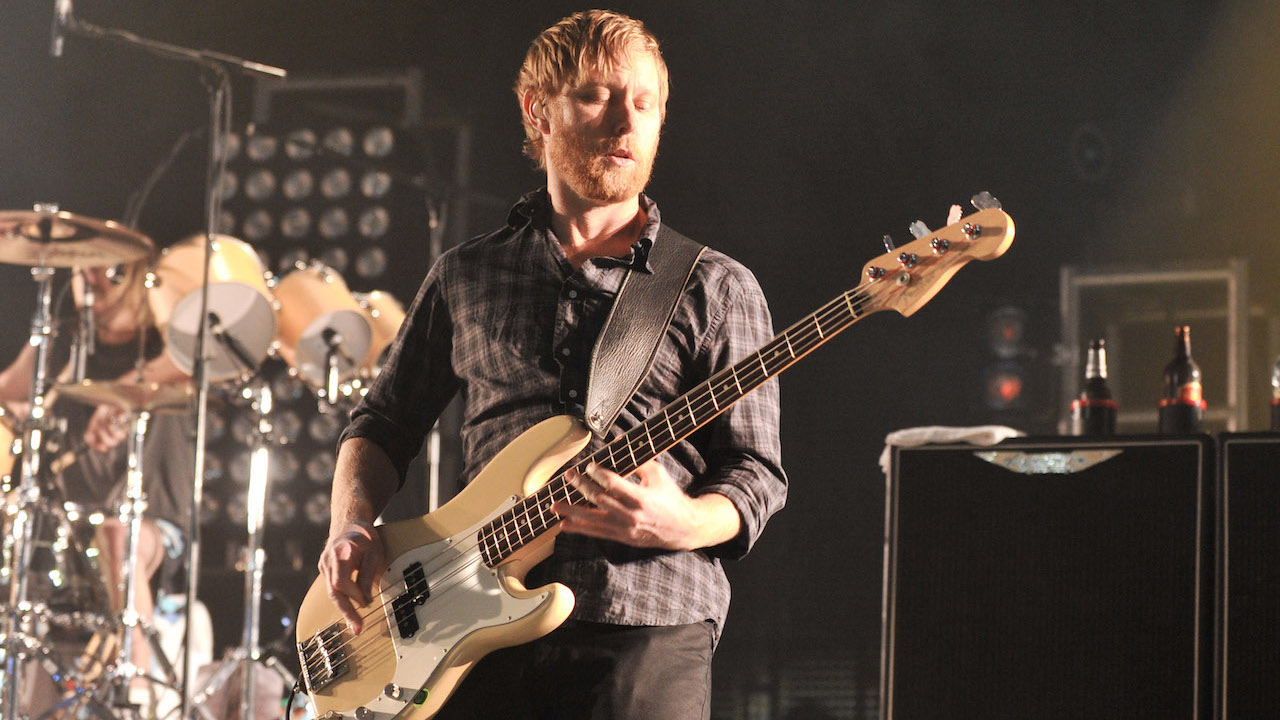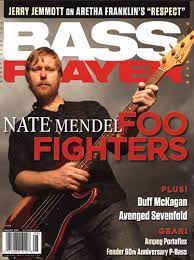“I've always played with a pick, but up until the fifth Foo Fighters record, I never played downstrokes”: How Nate Mendel changed the way he played bass to “support Dave’s songs as best as possible”
From the Bass Player Archive: An interview with Foo Fighters bassist Nate Mendel

If you’re familiar with the Foo Fighters’ big hits – Everlong, The Pretender, Times Like These, Waiting On A War and so on – you’ll know that they specialise in Rock with a capital R, designed for stadiums and beloved of crowds worldwide. It’s all a long way from bassist Nate Mendel’s youth as a punk kid from Washington.
“I just wanted to be in a band,” he told BP. “I was listening to the Ghost In The Machine album by The Police, and I was hugely into Sting, so when my friend suggested I should play bass guitar I thought it sounded like an awesome idea.”
From his proto-emo explorations with Sunny Day Real Estate to his post-grunge grooves with Foo Fighters, Mendel has since learned a lot about the dominant traits of great rock 'n' roll bass playing. Is he a better bass player these days than he used to be? “In some ways I am, and in some ways I’m not. I came into this band wholly unprepared to play in it. You can hear that on the first few records. I've realized that what I need to do is alter the way I play so I can support Dave's songs as best as possible.”
The following interview from the Bass Player archives took place in August 2011.
How did you first go about learning to play bass?
“I knew a guy who played in a local band, and I took a couple lessons with him. But then I just started to experiment and figure things out on my own. All through high school I played in punk rock bands – mostly in a band called Diddly Squat. We did a couple of tours around the country in a van. It was do-it-yourself on a pretty small scale, but it was a lot of fun. After that I moved to Seattle and joined Christ On A Crutch, another punk rock group that did a lot of touring. I was becoming more enthusiastic about hardcore punk rock and wanting to play more intricate music. That's when I formed Sunny Day Real Estate.”
Which bands were making a mark on you?
Get The Pick Newsletter
All the latest guitar news, interviews, lessons, reviews, deals and more, direct to your inbox!
“My musical education was pretty limited – it was all hardcore punk rock, like Minor Threat, Black Flag and Bad Brains. Instead of studying the bass playing of someone like John Entwistle, which would have given me a foundation of how to play, I just wanted to play a lot of notes really fast. That was the only goal.”

How did you understand your role as a bass player, and how did you go about playing that role in Sunny Day Real Estate?
“At the time, people were becoming more experimental within underground music, and not just thrashing out hardcore songs. We were influenced by bands like Rites Of Spring and Hayden, but we didn't sit down and strategize the kind of music we were going to play. We just got in a room and started making noise.”
Was songwriting a labor-intensive process?
“Some of the arrangements worked out, but it was really just trial and error. We wouldn't look at the song as a whole: we'd play one part of a song for an hour, and then somebody would take it off into another direction. It was jam-oriented, as opposed to being a situation where a songwriter would come up with a chord structure and then bring it to the band. We had two guitar players who liked to play intertwined guitar parts, so it wasn't always clear what the root chord was. I had a lot of freedom to come up with interesting basslines.”
How did you come to play with the Foo Fighters?
“Dave Grohl recorded what turned out to be the first Foo Fighters record in early 1994. Sunny Day broke up later that year. Dave's tape was circulating around town, and I knew there might be an opportunity to try out for the band. So I started listening to it and playing along. From my perspective at the time, the music seemed rudimentary: I wasn't mature enough as a musician to know that a well-structured pop song should be simple. Since then, I've realized that what I need to do is alter the way I play bass so it works in this band.”
How has that approach changed the way you play?
“I've always played with a pick, but up until the fifth Foo Fighters record, I never played downstrokes. I would alternate my picking. But with this kind of music, you need the consistency and percussive sound you get from playing with downstrokes. The other thing I've done is learn how to play tight and lock better with the drums. It comes down to subtlety and nuance; that was something I didn't grasp early on.”
When the Foo Fighters played the VH1 Rock Honors show in 2008, you took on two songs by the Who. How did you approach John Entwistle's parts?
“That was a tough one, because you can't replicate what he did unless you spend hours and hours figuring out his gear, his technique, etc. Basically, I just listened to the records, and I tried to get as close as possible to playing what he played. My basic goal was to keep up and not make a total ass out of myself. As the Foo Fighters have had opportunities to play shows like the VH1 Rock Honors, we've had a few of these kinds of challenges thrown our way. I always feel like I'm playing catch-up, but I've gotten pretty good at thinking on my feet.”
You're most often seen playing various Fender Precision Basses.
“Everybody’s got their magic bass in their mind, and mine is my '70s natural P-Bass with a maple neck, which cuts through perfectly. I also love Lakland basses, and I've used them on tour for drop-D tunings, but I'm a bit more comfortable playing Fender basses, so I play those for most of the set.”
Are you running through any effects?
“I'm not using many pedals these days. Now that we have three guitar players, there's a lot of distortion going on. So I try to keep it clean and stay in line with the kick drum. That way, I know that even if we're playing a big echoy venue, at least the bass will come across with some bite and precision.”
“When I first heard his voice in my headphones, there was that moment of, ‘My God! I’m recording with David Bowie!’” Bassist Tim Lefebvre on the making of David Bowie's Lazarus
“One of the guys said, ‘Joni, there’s this weird bass player in Florida, you’d probably like him’”: How Joni Mitchell formed an unlikely partnership with Jaco Pastorius









